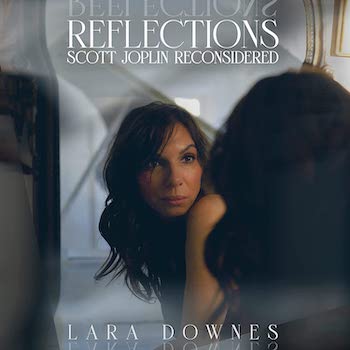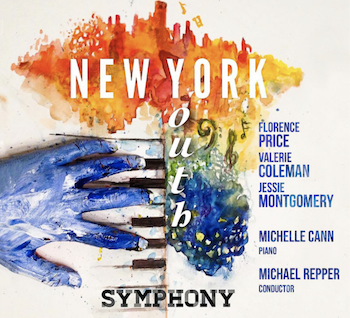Classical Album Reviews: “Reflections: Scott Joplin Reconsidered” and New York Youth Symphony plays Price, Coleman, and Montgomery
By Jonathan Blumhofer
Two first-rate albums: pianist Lara Downes successfully reconsiders Scott Joplin and the New York Youth Symphony plays Florence Price and others with panache.
 Pianist Lara Downes is on a roll. Following – or, rather, building – on last year’s New Day Begun, a revelatory survey of music by overlooked Black American composers, comes an effort to rethink Scott Joplin’s place in the canon. Titled Reflections, it does what no other Joplin disc (to my knowledge at least) attempts, namely to treat Joplin as a serious, versatile composer, not just the maker of enduring hits like The Entertainer and Maple Leaf Rag.
Pianist Lara Downes is on a roll. Following – or, rather, building – on last year’s New Day Begun, a revelatory survey of music by overlooked Black American composers, comes an effort to rethink Scott Joplin’s place in the canon. Titled Reflections, it does what no other Joplin disc (to my knowledge at least) attempts, namely to treat Joplin as a serious, versatile composer, not just the maker of enduring hits like The Entertainer and Maple Leaf Rag.
That can be a challenge. Even at his more reflective – like in the concert waltz, Bethena – Joplin’s writing maintains a charming façade. Knowing that the latter is a memorial to his wife of ten weeks provides some interpretive (and listening) perspective but achieving the right musical results without descending into bathos is difficult.
Downes, though, has a wonderful grasp of Joplin’s style. Her playing always sings and the music never fails to dance. Most notably, Downes affectingly draws out its melancholy turns, like the snaking inner voices and minore turns of Reflection Rag and the languorous habanera rhythms of Solace. In effect, she treats Joplin’s music in the manner of a Strauss waltz: rightly popular yet ineffably sad.
That’s not to say that Reflections is morose. Quite the opposite: for sweep, spirit, and character, Downes’ playing of Weeping Willow Rag, Peacherine Rag, and Euphonic Sounds is wonderful. Her readings, too, are all smartly weighted and voiced. As a result, there’s a welcome presence to much of the album’s fare.
On several numbers, Downes is joined by “The Band” – violinists Judy Kang and Chiara Fasi, violist Tia Allen, cellist Yves Dharamraj, and clarinetist/saxophonist Kevin Sun – as well as baritone Will Liverman, mandolinist/vibuela-ist Joe Brent, violinist Adam Abeshouse, and the Brooklyn Youth Chorus.
These collaborative selections – Maple Leaf Rag, Bethena, and the Magnetic Rag, particularly – serve to highlight the innate strength of Joplin’s musical ideas as well as the rich personality of his writing (the playful, dissonant turns and bent notes in Magnetic Rag are particularly well-served).
Liverman and Downes pull off a touching rendition of Joplin’s maudlin song “A Picture of Her Face” while Abeshouse tosses off the unpredictable arrangement of Elite Syncopations in the best manner of Grappelli or Menuhin. And the disc’s grand finale – “A Real Slow Drag” from Joplin’s opera Treemonisha – brings together, in a slightly mystical blur, Downes, The Band, and the Youth Chorus.
Taken together, it’s a thoughtful effort, played and sung with a fervency one doesn’t always associate with Joplin’s music. That it succeeds to well so well suggests that, indeed, he was a much better – and more important – composer than he’s usually credited for being.
 Joplin’s younger contemporary, Florence Price, has been the beneficiary of a much of attention over the last decade, most all of it for the good. Add to the last this new recording from the New York Youth Symphony (NYYS) and conductor Michael Repper, which pairs Price’s tone poem Ethiopia’s Shadow in America and her wonderful Piano Concerto in One Movement with works of more recent vintage by Valerie Coleman and Jessie Montgomery.
Joplin’s younger contemporary, Florence Price, has been the beneficiary of a much of attention over the last decade, most all of it for the good. Add to the last this new recording from the New York Youth Symphony (NYYS) and conductor Michael Repper, which pairs Price’s tone poem Ethiopia’s Shadow in America and her wonderful Piano Concerto in One Movement with works of more recent vintage by Valerie Coleman and Jessie Montgomery.
Completed in 1932, Ethiopia’s Shadow is a stirring homage to the Black American experience, at least as Price understood it to that point in time. Its three movements evoke struggle (especially in the toiling, surging gestures of the first movement), as well as religious devotion and, in much of the jaunty finale, optimism.
The NYYS’s reading here is shapely and well-directed, especially in the first movement’s Allegretto sequence. String textures and solos in the central Andante are luminous and, if the start-stop structure of the finale’s coda doesn’t quite flow with perfect smoothness, the ending’s still nice and big.
In the Concerto, heard here in its original 1934 version, the NYYS and pianist Michelle Cann deliver a performance of great color and focus. The orchestral performance is often lyrical and rich; the NYYS strings, in particular, play with tremendous confidence, especially in the first part’s stratospheric writing.
Cann’s account of the solo part is, throughout, fervent and well-balanced. While this isn’t the flashiest keyboard concerto from the 1930s, it’s plenty virtuosic and Cann has a wonderful feel for its style. Her duets in the Adagio with principal oboe Kara Poling are among the album’s highlights.
The release’s other selections, Coleman’s UMOJA: Anthem of Unity and Montgomery’s Soul Force, echo various aspects of the Price works.
UMOJA is essentially the exploration of a “simple melody” that’s based on Coleman’s eponymous choral anthem. Broad and songful, it showcases the ensemble idiomatically, though its diatonic, largely sunny peroration feels a touch generic.
Soul Force, on the other hand, is, like Ethiopia’s Shadow, filled with tough, unsettled gestures. Here, violent march rhythms counter a lyrical theme that’s put through its paces. Ultimately the tune emerges, singing soulfully and marching with determination. While the final gesture ensures that its apparent triumph isn’t unequivocal, this is captivating music of grit and perseverance.
The NYYS plays it all with panache. Perhaps it’s cliché to describe a group like this as a “professional orchestra made up of teenagers” but that’s basically what we’ve got. Some moments of raw ensemble tone aside, this group delivers – and at a very high level.
Jonathan Blumhofer is a composer and violist who has been active in the greater Boston area since 2004. His music has received numerous awards and been performed by various ensembles, including the American Composers Orchestra, Kiev Philharmonic, Camerata Chicago, Xanthos Ensemble, and Juventas New Music Group. Since receiving his doctorate from Boston University in 2010, Jon has taught at Clark University, Worcester Polytechnic Institute, and online for the University of Phoenix, in addition to writing music criticism for the Worcester Telegram & Gazette.

Lara Downes’ interpretation of Scott Joplin’s work is truly fascinating. She brings a fresh perspective to his music, showing that Joplin’s compositions go beyond just popular hits like The Entertainer—they have depth and melancholy that are often overlooked.
If you enjoy discovering new musical interpretations or are a fan of unique performances, you might want to check out CKORD.